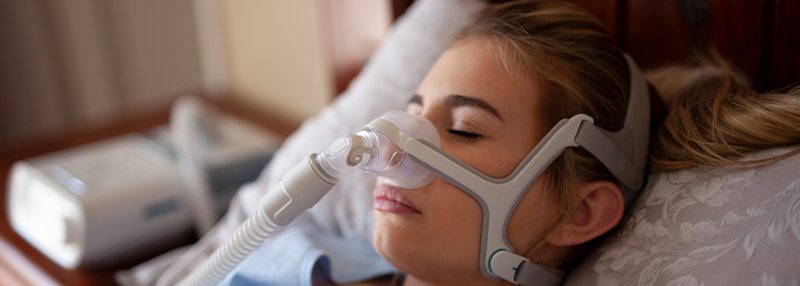What Are Three Types of Sleep Apnea?
Posted On: October 2, 2024 by CarePro Health Services in: Health Sleep Apnea Sleep Therapy

Sleep apnea is a common yet serious sleep disorder that affects millions of people worldwide. It occurs when a person’s breathing is repeatedly interrupted during sleep, leading to poor sleep quality and various health issues. There are three main types of sleep apnea: Obstructive Sleep Apnea (OSA), Central Sleep Apnea (CSA), and Complex Sleep Apnea Syndrome (CompSAS). Understanding these types can help in identifying symptoms and seeking appropriate treatment.
1. Obstructive Sleep Apnea (OSA)
Obstructive Sleep Apnea is the most common form of sleep apnea. It occurs when the muscles in the throat relax excessively during sleep, causing a blockage in the airway. This obstruction can lead to loud snoring, choking, or gasping for air.
Symptoms of OSA:
- Loud snoring
- Episodes of stopped breathing during sleep
- Gasping or choking during sleep
- Morning headaches
- Excessive daytime sleepiness
- Difficulty concentrating
Risk Factors:
- Excess weight
- Neck circumference
- A narrowed airway
- Being male
- Age
- Family history
- Use of alcohol, sedatives, or tranquilizers
- Smoking
Treatment Options:
- Continuous Positive Airway Pressure (CPAP) therapy
- Oral appliances
- Lifestyle changes (weight loss, avoiding alcohol)
- Surgery (in severe cases)
2. Central Sleep Apnea (CSA)
Central Sleep Apnea is less common than OSA and occurs when the brain fails to send proper signals to the muscles that control breathing. Unlike OSA, there is no physical blockage in the airway.
Symptoms of CSA:
- Episodes of stopped breathing during sleep
- Shortness of breath that awakens you
- Difficulty staying asleep (insomnia)
- Excessive daytime sleepiness
- Difficulty concentrating
- Mood changes
Risk Factors:
- Heart disorders
- Stroke
- Use of certain medications (e.g., opioids)
- High altitude
Treatment Options:
- Adaptive Servo-Ventilation (ASV)
- CPAP or BiPAP machines
- Supplemental oxygen
- Medications to stimulate breathing
3. Complex Sleep Apnea Syndrome (CompSAS)
Complex Sleep Apnea Syndrome, also known as treatment-emergent central sleep apnea, is a combination of both obstructive and central sleep apnea. It typically occurs when someone with OSA develops CSA while undergoing treatment for OSA, usually with CPAP therapy.
Symptoms of CompSAS:
- Symptoms of both OSA and CSA
- Persistent apnea events despite CPAP therapy
Risk Factors:
- Existing OSA
- Use of CPAP therapy
Treatment Options:
- Adjusting CPAP settings
- Switching to BiPAP or ASV machines
- Addressing underlying conditions
Understanding the different types of sleep apnea is crucial for effective diagnosis and treatment. If you or a loved one experience symptoms of sleep apnea, it’s important to seek medical advice.
Proper treatment can significantly improve sleep quality and overall health. At CarePro Home Medical and Kelly’s Home Medical, we offer all the equipment you need for sleep therapy including CPAP machines, CPAP masks and various CPAP accessories. Take a look at some of what we carry in our catalog today or stop by a store near you.

0 comments